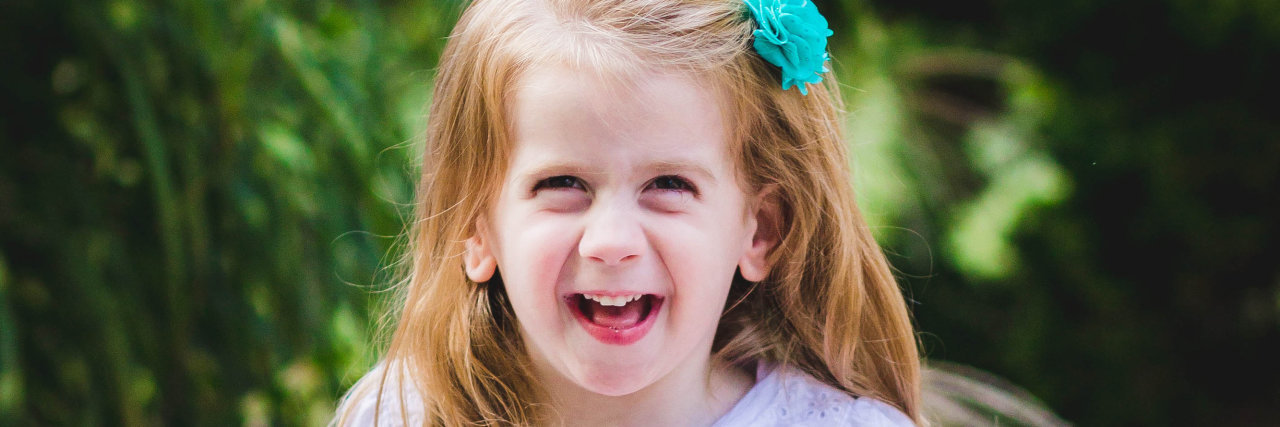I sit here, on a plane, traveling back from San Diego where our family has spent the last four days with our tribe. These are people we’re linked to because of a single gene on our daughter’s X-chromosome: the DDX3X gene. Because of a spelling error at conception in just one of their 60,000 genes, our daughters’ share a world of similar challenges and joys.
Our family’s membership in the tribe started on September 16, 2015, with a phone call from our geneticist. I still remember the pause before words flowed from his mouth. In that moment, I wondered how this new piece of information would change our daughter’s life and our family. “We’ve found the answer to your daughter’s delays,” he said, “it’s a mutation of her DDX3X gene.” He provided us with a very recently published peer-reviewed journal article and walked us through what he had spent the last several hours learning about the rare condition.
Hours later, my husband and I turned to social media to find someone…anyone who had a daughter with this same diagnosis. We found not one, but a community of about 30 families with a daughter or daughters with a DDX3X mutation. There, in a private Facebook group, I posted our daughter’s picture and received a warm and loving welcome from moms, dads and grandparents from the United States and the Netherlands. But more precious than any words, were seeing their precious and beautiful daughters’ faces. As we scrolled through these beautiful children’s photos, I had such hope. These children were so much like our daughter…and they were happy and thriving.
Our pediatrician wasn’t overly optimistic about genetic testing. “It’s expensive. It’s often inconclusive. It leads to more questions than answers.” And my favorite, “It’s not like it’s going to change your treatment plan.” It’s not that our pediatrician wasn’t supportive, he just didn’t understand the importance of belonging to a tribe. But something, deep in my momma-gut said, “We have to keep going. Stopping now is not an option.” And, without a fight, our pediatrician sent us off to genetics, where we spent the next nine months searching. Our last chance for answers was whole exome sequencing (WES) — the Cadillac of genetic testing. I’ve talked with other parents of kids with disabilities who have an undiagnosed child. They have so many questions — questions doctors can’t answer, questions Google can’t answer, questions only someone else in their same shoes can answer. But they haven’t found those people yet — they haven’t found their tribe.
We live in Virginia, where there are only two known cases of DDX3X. A state of 8.4 million people, yet only two known cases. The city of San Diego alone has three known cases. Are other pediatricians steering parents away from connecting with their tribe? Maybe they don’t understand what’s at stake. Maybe you, as a parent, reading this, don’t understand what’s at stake.
Let me share how receiving our diagnosis has changed our family:
1. The self-doubt halted.
I immediately stopped fine combing my pregnancy with my daughter wondering what I could have done differently. I now know nothing I could have done differently would have changed our daughter’s condition. Her de novo gene mutation was beyond any human control. I know each momma in our DDX3X tribe feels this same relief.
2. Our treatment plan has changed.
Last year, after attending our family’s first DDX3X family day, we learned several of the girls also had an autism spectrum disorder diagnosis and received applied behavior analysis (ABA) therapy. We learned this form of therapy broke down barriers for their girls to gain social, communication and daily living skills. Now, a year later, our daughter is experiencing those same benefits of ABA therapy. Without our tribe, we would have never explored this form of therapy — and chances are, she’d still be without the critical social, communication, and daily living skills she now processes.
3. You become the expert.
We now go to our doctors with the upper hand. We learn so much from our tribe that we educate our doctors, therapists and school personnel about what tests, diagnosis, and treatments our daughter needs. And to be honest, every doctor we’ve seen has welcomed our newfound expertise. Our pediatrician says, “So what have you learned since we last talked?” They look to us for answers because our tribe is their best means of education and treatment.
4. Our tribe has mobilized.
We have raised a small but impressive sum of money to begin funding research. And we have a real shot at getting to a drug trial that could improve the richness of our girls’ lives in just a few short years. If we weren’t part of the tribe, we could be missing out on real solutions for our daughter. And every individual counts when it comes to research and trials because critical mass is needed to have statistically valid data and interest from pharma companies. According to ClinVar, there are approximately 160 individuals now diagnoses with a DDX3X mutation in the world. DDX3X is likely a heavy hitter in the intellectually disabled population, accounting for up to one percent of undiagnosed females.
Chances are, you belong to a tribe, too. Maybe it’s the DDX3X tribe, or maybe it’s another tribe, but there is a tribe out there for you. You need it just as much as it needs you. You just need your membership card. Fight for your tribe, because it will change your life for the better. It doesn’t matter if your child is 4 months old or 45 years old, the fight for answers is worth the battle.
About DDX3X: DDX3X gene mutations have been linked to intellectual disabilities, seizures, autism, poor muscle tone, movement disorders and slower physical developments. To learn more about DDX3X or to support the children with this condition and the families who love them, visit ddx3x.org.
We want to hear your story. Become a Mighty contributor here.



